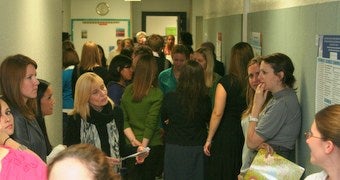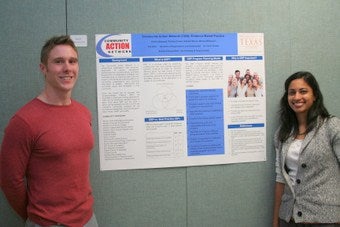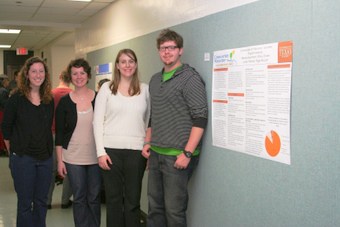Eleven community projects ranging from partnerships with the Texas Criminal Justice Coalition to the Sustainable Food Center were featured in a recent poster presentation by first-year master’s of social work students.
The 57 students were part of Dr. Cal Streeter’s Dynamics of Organizations and Communities classes. Many are new to Austin and new to social work.
“The community projects give students the opportunity to gain hands-on experience with some of the ideas and concepts we are learning in the class,” said Streeter. “It also helps them begin to make contact with agencies and professionals in the community who are working on real issues of concern to social workers and give back something of great value to our partners.”
“When we approach organizations in the community they have a tendency to assume we want to place a volunteer,” said Michael Balliro, social work Ph.D. candidate and Streeter’s teaching assistant. “We decided to fashion a model of community engagement that was truly reciprocal.
“We entered into contracts with the community partners where we dedicated a group of students to a research project in hopes of expanding the scope of services currently delivered by organization,” he said. “Our students had the opportunity to apply some of the content delivered in class.
“It was a win-win for both the student and the organization.”
As master’s level social work students are expected to complete a practicum in the community each year of the program, community engagement work of this type also serves to introduce the student to a variety of social work service agencies available for such placements. Some of the community partners have come to embrace the idea that they may one day serve as a placement for students.
This is the third year that Streeter and Balliro have sought out community partners for student research projects and the second year where they required students to represent their findings in poster form. The poster presentation at the end of the semester not only brought students together from both classes, but also served as an opportunity for the community partners to attend and see the array of work being done across the community.
“Networking opportunities have sprung from this event, and many community partners are motivated to immediately propose projects for the following year,” said Balliro.

In choosing the partners, Balliro said he reached out into untapped organizations with “novel needs not typically addressed in social work.” Two projects, for example, were developed at the Sustainable Food Center (SFC), an organization that manages access to community gardens across Austin, among other responsibilities.
“Students needed no explanation how important food security issues are to our clients and instantly saw the value of SFC initiatives,” said Balliro, adding that the SFC is well positioned in the community to turn the student research projects into something more tangible.
Research from a recent past year explored what it would take to allow consumers to use their food stamp benefits for purchases made at the farmers market. The project resulted in effective legislative advocacy by the SFC, which directly led to the availability of electronic debit machines at such markets all across the state.
“So, today, those who depend on food stamps are able to apply their benefit toward the purchase of more nutritious fare that is not typically found in the under-resourced communities where they might live,” said Balliro.
Students Charlie Sheppard, Reshma Solanki, Nathalie Warren and Michael Williamson worked with the Community Action Network (CAN), which is a collaboration of organizations and individuals in Travis County who are working together to build a community of “equity and opportunity.”

“The community work was valuable because we got to interact with a well-known Austin organization made up of many partners,” said Solanki. “Because we were all first-year graduate students, the connection to professionals in the field helped cement how something that was read about in class is carried out in real life.”
Another group of students worked on a project examining policies concerning Post Traumatic Stress Disorder (PTSD) and Traumatic Brain Injury (TBI) in Texas state prisoners. The community partner was Texas Criminal Justice Coalition.
“The project was valuable in a number of ways,” said student Amy Jones. “Working with a group of five other students (Corina Jay, Elizabeth Endres, Jason Lee, Katherine Lawrence and Noelle Garza) on a semester-long project was valuable because it allowed us to bring our individual strengths to the project and to appreciate each others’ strengths.”
Jones said one of her interests is in working with people “who are easily dismissed as ‘bad’ and, therefore, undeserving of help. Prisoners are a textbook example of that. It was really eye opening, and I was shocked to learn how prevalent the two conditions (PTSD and TBI) are in prison populations.”


